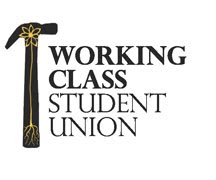As a student journalist and communications intern, I’m naturally fascinated by political unrest. The recent rallies in protest of Governor Scott Walker’s proposed budget repair bill (http://legis.wisconsin.gov/JR1SB-11.pdf) have been a particularly interesting event for me to watch unfold.
But I have only been able to watch from the outside. During times of major protesting and rallies, I’ve been working. Perhaps it’s ironic, since the future cost of my tuition is uncertain, and I’m unable to stand up against it because I’m otherwise occupied trying to pay my current tuition. That aside, it’s been a fascinating experience to see as an observer.
I work two blocks from the Capitol on State Street, in a building with a wall of windows facing the street. Heavy foot traffic and high visibility have lent themselves to a good amount of people watching. The most interesting thing for me to see has been the variety of signs. If their voice cannot be heard, it can be seen.
Apart from the standard “Kill the Bill” or “Stop the Attack on Wisconsin Families”, and a good amount of jokes or obscenity, I’ve seen a good mix of different messages. My favorite so far is also pretty common, “If you can read this, thank a teacher”.
Teachers are by far some of the most vital members of our community. Education is the tool which people use to develop skills and become a contributing member of society. As a first-generation college student, I’ve fought hard to get an education, and I appreciate every one of my teachers and professors that have gotten me this far. The fact that the quality of education I will receive in the future is in jeopardy is unsettling. Financial recovery at the cost of education is an incredibly nearsighted, dangerous prospect of fixing the present without considering the possible implications of the future.
Perhaps soon, when I’m not studying (none of my classes have been cancelled thus far, a fact that I’m also appreciative of) or working, I’ll be able to make it to the Capitol to see for myself what’s going on. This is an incredible time to be a part of a democracy, as we’ve seen in Tunisia and Egypt, and an increasing number of other Middle Eastern countries. In my journalism class, we learned about a concept called “mediated worldliness”, which is the idea that through the media, we are able to experience things and be a part of events all around the world. We can all feel like we’re a part of the democratic process surrounding the passing of this bill by reading about it or hearing about it. Regardless of affiliation, nothing is a substitute for actually standing up, saying something, having an opinion, or voting.
Be an active part of your democracy and value your education that allows you to do just that, they are both things we all tend to take for granted.



